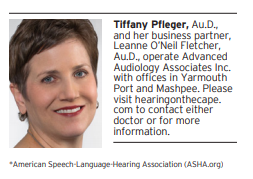By Tiffany Pfleger, AuD
Most of us don’t have 20/20 vision. No problem — we get glasses or contact lenses. So why is it that nearly onethird of the 40 million adults in the U.S. who report hearing difficulties don’t seek treatment?
Unfortunately, even with countless studies and initiatives to raise awareness, people with hearing loss are still widely subject to prejudices and misconceptions. In other words, there is a very real stigma that is associated with hearing loss. In fact, some experts say that this negative stigma is more of a deterrent to getting a hearing aid than the out-of-pocket cost. Many people do not address the problem at all, and of those who do, it still takes the average person seven years to act on their hearing impairment.
This is a problem for many reasons. The obvious one is that many people with hearing loss are missing out on a better quality of life — not because there is no remedy but because of an antiquated stigma. And the impact can be much worse. Studies have shown that hearing loss gone unchecked and untreated can result in isolation, depression and early onset dementia. We think it’s important to shed some light on the myths that keep the hearing loss stigma alive. Here are seven common misconceptions, and some thoughts on what you can do to help break the stigma for good.
Seven Misconceptions About Hearing Loss
Misconception #1: Hearing aids don’t really work.
The truth: Modern hearing aids are sophisticated electronic instruments, adapted individually by audiologists. Hearing aids almost always result in better hearing and a better quality of life.
Misconception #2: Hearing aids are big and unsightly.
The truth: Hearing aids have come a long, long way. Today’s hearing aids are small, discreet and well-disguised. There are many low-profile designs and, for people mild or moderate hearing loss, “invisible-in-the-canal” (IIC) or completely-in-the-canal (CIC) hearing aids may be an option. These styles fit very deeply in the ear canal and offer high cosmetic appeal for people who desire a discreet solution.
Misconception #3: Hearing aids are uncomfortable.
The truth: Like anything new, it may take some time to become comfortable with new hearing technology. But in reality, once the wearer becomes accustomed to hearing better, the overall comfort is improved and vastly outweighs any downsides.
Misconception #4: Hearing loss is just part of the aging process.
The truth: Hearing loss may accelerate with age, but that doesn’t mean it’s inevitable. And, you may be surprised to know that nearly half of all hearingimpaired people are of working age or younger.
Misconception #5: It’s not a big deal if hearing loss is just in one ear.
The truth: We hear best when both ears work together. When hearing in one ear is compromised, you can lose not only amplification but clarity, especially in noise and the ability to localize sounds. Misconception #6: Hearing-impaired people just aren’t listening. The truth: Hearing impairment is not equal to selective hearing. One’s ability to hear depends on the degree and type of hearing loss they have, in addition to their surroundings. So while it may be frustrating to converse with someone where you have to repeat yourself or speak louder, a person with hearing loss isn’t trying to spite you.
Misconception #7: Dealing with hearing loss is better than having to wear hearing aids.
The truth: Just like correcting your vision with prescription lenses, addressing hearing loss with hearing aids is nothing to be ashamed about. Untreated hearing loss affects you in many ways —and straining to listen to others has been linked to deteriorating mental function. But there are options, and hearing loss is often treatable
What you can do to help break the stigma
The single best thing you can do it to get your hearing tested annually and encourage your loved ones to do the same. If you have hearing loss, seek treatment. It’s important to speak up about hearing loss. Being vocal about your own loss will help lower the stigma for others. Hearing is something to be valued and, by protecting your own hearing, it helps break a stigma that’s time has long passed.

Breaking the SOUND BARRIER Misconceptions about hearing loss — and breaking the stigma

Select to Read Similar Content:




















